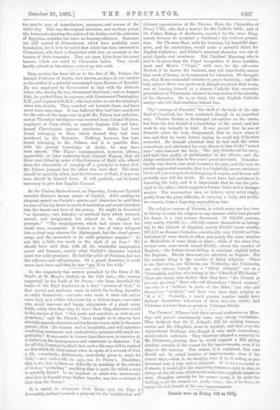In the singularly fine sermon preached by the Dean of
St. Paul's at St. Mary's, Oxford, on the 15th inst.,---the sermon suggested by the death of Dr. Pusey,—the Dean described the leader of the High Anglicans as a true "servant of God," in that special and exclusive sense in which the leading Apostles so called themselves,—servants who made it their sole end to serve God, as a soldier volunteers for a forlorn-hope,—servants who avoid innocent and happy enjoyments of a groat many kinds, solely that they may do more than theysotherwise could in the service of God. " Otir poets and novelists, as well as our preachers," said Dr. Church, "have taught us to observe how strongly opposite elements and tendencies can co-exist in the same person ; that the human soul is hospitable, and will entertain conflicting sentiments and contradictory opinions with much im- partiality.' It was easier in former days than now, to conceive of, to believe in, the homogeneous and consistent in character. Yet, for all this, I venture to think that such a life may still be realised as that which St. Paul meant when he spoke of a servant of God, .a life con B6011 sly, deliberately, exclusively given to work for God,"—and such a life, he says, was Dr. Pusey's. Doubtless, that is so ; but is there no difficulty in speaking of the service of God as " excluding " anything that is good, for which a man is specially fitted ? Is an engineer or artist who strenuously cherishes in himself every higher impulse, any less a servant of God than Dr. Pusey ?


































 Previous page
Previous page